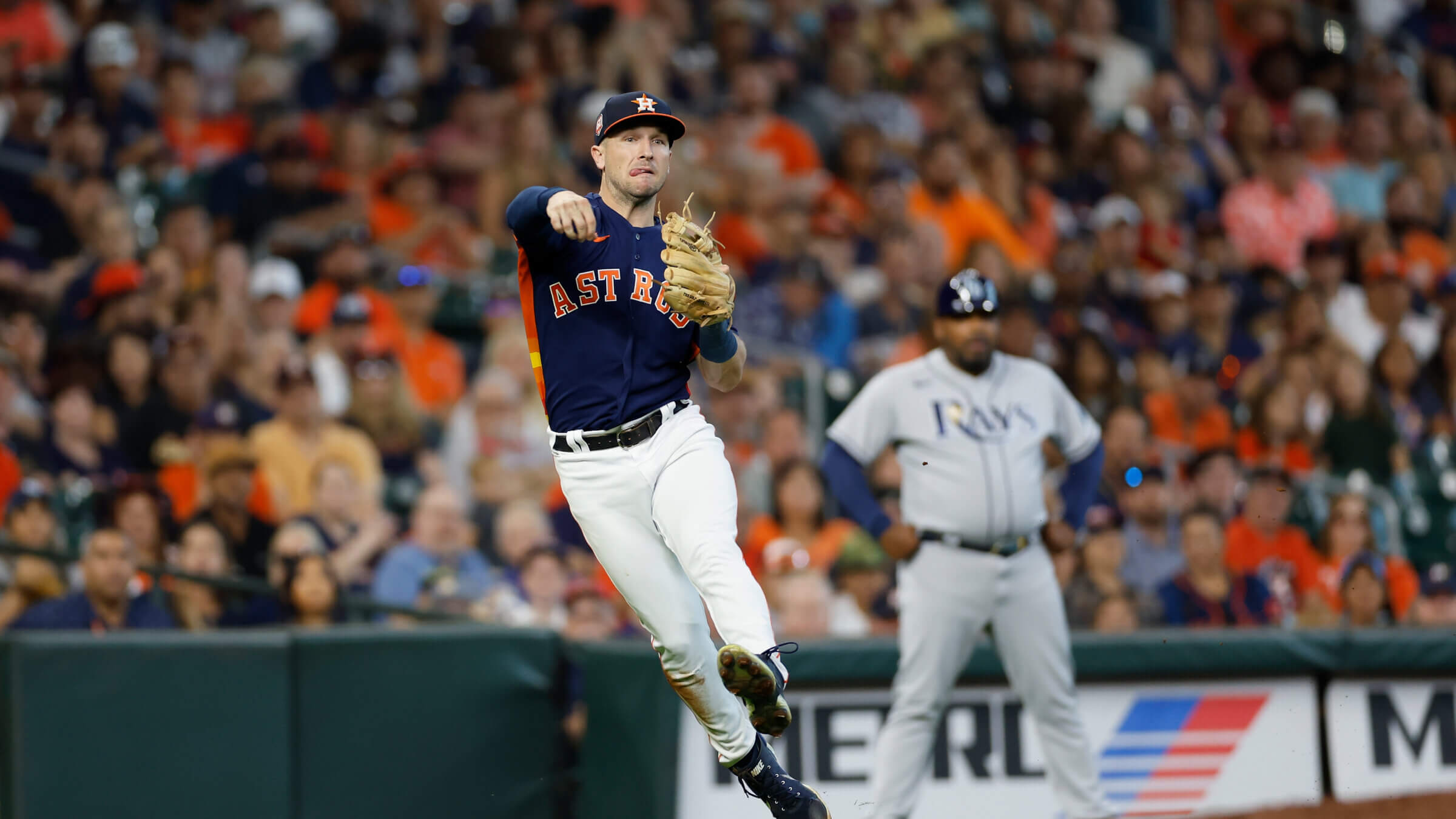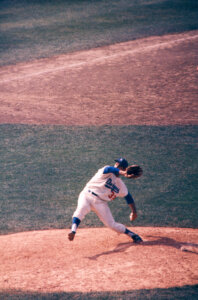How at least one Jewish baseball player has beaten the Koufax jinx and the Kol Nidre curse
Statistics prove that playing on the holiest day of the year can be problematic for some Jewish players — not so for Alex Bregman

Alex Bregman faces the Tampa Bay Rays on Oct. 2, 2022. Photo by Getty Images
During the 2022 Major League Baseball season, 16 Jewish players appeared in at least one game, continuing a string of seasons when Jewish players were in the double digits. In 2020, I published an essay, along with a larger study, testing the Koufax Curse — measuring individual and team performance when Jewish players play on Yom Kippur rather than following in the footsteps of Sandy Koufax, who famously did not pitch Game One of the 1965 World Series on Yom Kippur 5726.
That study found that any Koufax Curse would seem to target teams more than Jewish players. Individual performances were mixed but teams lost more than they won, especially on Kol Nidre. And team performance measured by run differential — the difference between runs scored and runs allowed — showed that the records should have been worse.
Using statistics from this year, we have updated our analysis of the Koufax Curse and the general question of how Jewish players perform on the holiest day of the Hebrew year.
Testing the Koufax Curse (another look)

The 2020 study covered a 53-year period. It began in 1966 (Yom Kippur 5727), the year after Koufax’s career-defining moment, and ran through 2019 (Yom Kippur 5780), when three Jewish players appeared in post-season games on Yom Kippur and their teams lost important games. The study included 18 pitchers and 18 non-pitchers. Six remained active from 2020-22.
Active non-pitchers include Alex Bregman (Astros), Joc Pederson (Dodgers in 2020, Braves in 2021 and Giants in 2022), Kevin Pillar (Giants in 2020, Mets in 2021 and Dodgers in 2022, although he missed the season due to injury), and Rowdy Tellez (Blue Jays 2020 and Brewers 2021-22).
The active pitchers are Richard Bleier (Marlins) and Max Fried (Braves).
No MLB games were played in 2020 (Yom Kippur 5781); the holy day fell on an off-day between the final day of the season and the first post-season games. In 2021, Yom Kippur (5782) fell on a Wednesday and Thursday in mid-September; a few teams played on Kol Nidre and a few on Yom Kippur evening but none during the day.
In 2022, Yom Kippur covered the final two days of the regular season; there were two complete slates of games during the holy day — all but two teams played in the evening during Kol Nidre and every team played during Yom Kippur day to finish their seasons.
This table shows team records and performance in the original study through 2019; it covers games in which Jewish players appeared during Kol Nidre, during the afternoon of Yom Kippur day and Yom Kippur evening (during Neilah, Tekiah Gedolah and break fast).
In 2021, teams went 1-3 with a -7 run differential (scoring 19 and allowing 26) on Kol Nidre and 1-0 with a 12-1 win on Yom Kippur evening; the overall holy day record was 2-3 with a +4 run differential (31 scored, 27 allowed). In 2022, teams went 1-1 with a +6 run differential (12 scored, 6 allowed) on Kol Nidre and 1-1 with a -1 run differential (5 scored, 6 allowed) during the day; the holy day record was 2-2 with a +5 run differential (17-12).
This table updates team records through 2022:
Kol Nidre remains the trouble spot and the locus of the Koufax Curse. Teams sit at 10 games under .500, with a lower winning percentage and a worse run differential. On Yom Kippur evening (games ending after the shofar has blown), teams moved to a winning record. But run differential suggests a performance worse than those records — teams should have won fewer games than they did on Kol Nidre, post-holy-day evenings, and overall. As I wrote two years ago, this may suggest a Koufax Blessing — Hashem helping teams overcome their poor performances to win more games than they should.
Among individual players in the study, Bregman, the highest-profile active Jewish player, may have beaten the Koufax Curse. He played three Yom Kippur games the past two seasons, going 4-for-12 with 5 RBI; he has eight hits in eight career Yom Kippur games, more than halfway to the record. And the Astros won those three games. On Yom Kippur day 2022 (5783), Tellez hit what could have been the game-winning home run in the 8th inning for the Brewers, although the team lost when the bullpen gave up the lead in the 9th inning.
The Koufax Curse, 2022

Considering the number of Jewish players appearing in the major leagues this season, Yom Kippur 5783 may have been the richest baseball holy day. Eight teams featured Jewish players in at least one game; two of those teams played one another, as Bregman’s Astros twice beat the Phillies and their back-up catcher, Garrett Stubbs. Stubbs had a hit and a walk on Kol Nidre, then struck out three times on Yom Kippur day.
Pitching woes told the story this holy day. Four relief pitchers appeared on Yom Kippur day — Eli Morgan (Guardians), Zach Weiss (Angels), Jake Fishman (Marlins) and Noah Davis (Rockies), a late-season call-up making his major league debut. Morgan, a key member of the Guardians’ bullpen, pitched one perfect inning. The rest struggled. Weiss surrendered two runs and two hits, including a home run, in one inning. Fishman surrendered three hits and a run in 1/3 of an inning. And Davis surrendered two runs, three hits (including a home run) and a walk in one inning in his first MLB game, although he struck out two batters.
An almost-test of the Koufax Curse

Baseball on Yom Kippur 5783 turned out to be anti-climactic. At the beginning of play, as Jews ate and headed to Kol Nidre, only the National League’s Eastern Division remained unsettled. Although the Mets and Braves both qualified for the post-season, they had not yet determined who would be division champion with a first-round bye. The Braves had led the Mets by 1 ½ games, needing one win (or one Mets loss) to clinch. The Braves won to earn the division title, as the Mets swept a double-header.
But imagine the Braves had lost that evening. The teams would have entered the season’s final game tied, the Braves needing to win (or the Mets to lose) to ensure the division title. Wednesday would have been Fried’s turn to pitch; the game started at 4:10 p.m. EDT, as people entered Neilah. What would Fried and the Braves have done? Fried has never indicated that he would not play on the holy day. He pitched in 2019, surrendering four earned runs in less than two innings of relief, although that was before he became an All-Star, the staff ace, and the best lefty Jewish starter in 50 years.
Much would have depended on the importance Fried and the Braves would have attached to winning the division, though it seems unlikely Yom Kippur would have entered the calculus.
At any rate, five teams in this year’s postseason have Jewish players, and the new Gilten Alter (“Golden Age”) of Jewish baseball continues apace.
A message from our Publisher & CEO Rachel Fishman Feddersen

I hope you appreciated this article. Before you go, I’d like to ask you to please support the Forward’s award-winning, nonprofit journalism so that we can be prepared for whatever news 2025 brings.
At a time when other newsrooms are closing or cutting back, the Forward has removed its paywall and invested additional resources to report on the ground from Israel and around the U.S. on the impact of the war, rising antisemitism and polarized discourse.
Readers like you make it all possible. Support our work by becoming a Forward Member and connect with our journalism and your community.
— Rachel Fishman Feddersen, Publisher and CEO





























